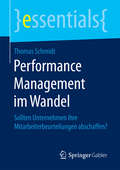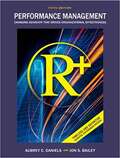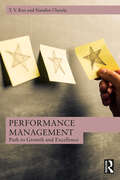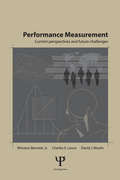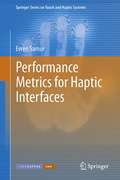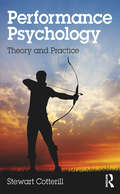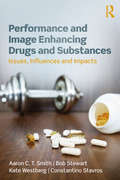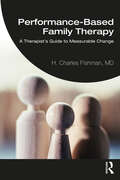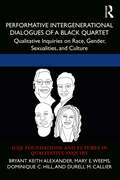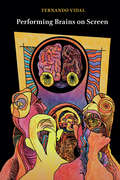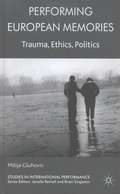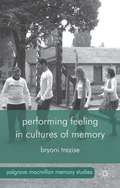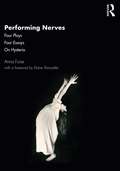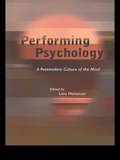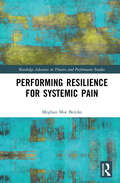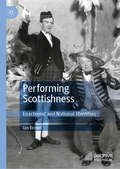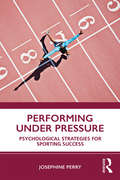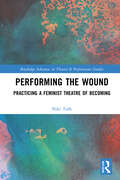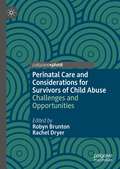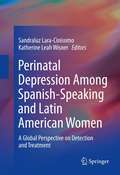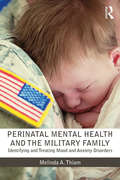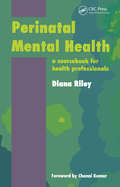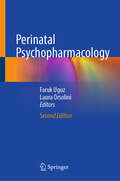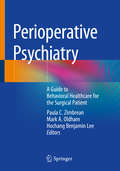- Table View
- List View
Performance Management im Wandel: Sollten Unternehmen ihre Mitarbeiterbeurteilungen abschaffen? (essentials)
by Thomas SchmidtDas vorliegende essential befasst sich mit der Beurteilung von Mitarbeitern und gibt einen #65533;berblick #65533;ber den neuesten Stand von Forschung und Praxis. Dazu werden die Ergebnisse einer Befragung von 125 Unternehmen zum Thema ,,Mitarbeiterbeurteilung im Wandel" vorgestellt, die mit Unterst#65533;tzung der Frankfurt School of Finance & Management und der Deutschen Gesellschaft f#65533;r Personalf#65533;hrung (DGFP) durchgef#65533;hrt wurde. Wie kann man neue, innovative Performance-Management-Systeme einf#65533;hren? Wie schafft man Prozesse, die auf die Herausforderungen durch Digitalisierung und die Dynamisierung der globalen #65533;konomie eine Antwort geben? Dieses essential zeigt Wege dazu auf.
Performance Management: Changing Behavior That Drives Organizational Performance
by Jon S. Bailey Aubrey D. DanielsEven though this book in one edition or another has been in existence for 32 years, the use of behavior technology in the workplace is still in its infancy. Since the fundamental laws of behavior don't change, those who learn to apply this technology successfully, will have a clear performance advantage over those who don't.
Performance Management: Path to Growth and Excellence
by T. V. Rao Nandini ChawlaThis book attempts to shift focus from performance appraisals to performance management incorporating performance planning, analysis, and development as critical components of it. The performance management system (PMS) is a future-driven exercise rather than merely a past-reviewing exercise. Performance management is treated as a year-round practice and not an appraisal process conducted once a quarter or annually. Moreover, it is now considered to be everyone’s responsibility and not merely that of HR or the upper management.This book advocates the structuring of PMSs and their implementation. It incorporates the most modern 360-degree feedback systems and shows the ways and means of integrating it into PMS. Arguments are offered to use rating-less appraisals and/or a combination of appraisals with 360-degree feedback. It defines performance management to mean continuous improvements in performance of individuals, their teams, departments, and corporations. It also outlines that planning, analysis, review, coaching, and capability building are essential building blocks for good performance management.Concise, lucid, and engaging, this volume would be useful to the students, researchers, and faculty of human resource management, organizational behaviour and applied psychology. It would also be an invaluable guidebook for practicing business executives and HR professionals to help them implement the performance management system for effective talent management leading to increased productivity.
Performance Measurement: Current Perspectives and Future Challenges (Applied Psychology Series)
by Charles E. Lance Winston Bennett David J. WoehrOver the course of the past few years, teaching, research, and practice has underscored the importance of performance measurement and criterion development as topics of great interest, considerable debate, and some misunderstanding. It has also become clear that the field needs to address a compendium of research, applications, and issues. Performance Measurement: Current Perspectives and Future Challenges brings together internationally recognized leaders in the field and each examines the subject matter in a way that has never been done--focusing on the dynamic nature of work and the tremendous demands being placed on assessment and measurement as core organizational activities. It also uniquely uses their expertise to provide critical pointers to not only the practical implications of work in the field, but also to the new and continuing issues to be addressed and research to be conducted. The book will be useful to both scientists and practitioners.
Performance Metrics for Haptic Interfaces
by Evren SamurHaptics technology is being used more and more in different applications, such as in computer games for increased immersion, in surgical simulators to create a realistic environment for training of surgeons, in surgical robotics due to safety issues and in mobile phones to provide feedback from user action. The existence of these applications highlights a clear need to understand performance metrics for haptic interfaces and their implications on device design, use and application. Performance Metrics for Haptic Interfaces aims at meeting this need by establishing standard practices for the evaluation of haptic interfaces and by identifying significant performance metrics. Towards this end, a combined physical and psychophysical experimental methodology is presented. Firstly, existing physical performance measures and device characterization techniques are investigated and described in an illustrative way. Secondly, a wide range of human psychophysical experiments are reviewed and the appropriate ones are applied to haptic interactions. The psychophysical experiments are unified as a systematic and complete evaluation method for haptic interfaces. Finally, synthesis of both evaluation methods is discussed. The metrics provided in this state-of-the-art volume will guide readers in evaluating the performance of any haptic interface. The generic methodology will enable researchers to experimentally assess the suitability of a haptic interface for a specific purpose, to characterize and compare devices quantitatively and to identify possible improvement strategies in the design of a system.
Performance Psychology: Theory and Practice (The\psychology Of Everything Ser.)
by Stewart CotterillAnyone who has ever competed in a sport, taken an exam, or appeared on stage understands the importance of performing at the right time. Those who excel in these conditions often develop ways to cope with the stress involved, but what cognitive and emotional strategies allow some people to thrive under pressure whilst others are inhibited by it? In Performance Psychology: Theory and Practice, Stewart Cotterill examines not only how stressful situations can affect performance, but also the means by which we can reach our potential regardless. Featuring chapters on decision-making, emotion, resilience and mental toughness, cognition and perception, ageing and experience, confidence, and recovery, this is the definitive textbook in the field, mapping the core theoretical concepts but also offering practical guidance on how performance can be improved. Also including chapters on motor skills and nutrition, it is a complete and comprehensive overview of this growing field of study. Including study questions and further reading in each chapter, Performance Psychology: Theory and Practice will appeal not only to students and researchers across applied psychology, but also coaches and performers looking for ways to realize their potential when it really matters.
Performance and Image Enhancing Drugs and Substances: Issues, Influences and Impacts
by Bob Stewart Aaron Smith Constantino Stavros Kate WestbergIn the pursuit of more muscle, enhanced strength, sustained endurance and idealised physiques, an increasing number of elite athletes, recreational sport enthusiasts and body-conscious gym-users are turning to performance and image enhancing drugs and substances (PIEDS). In many instances, such use occurs with little regard for the health, social and economic consequences. This book presents a nuanced, evidence-based examination of PIEDS. It provides a classification of PIEDS types, physical impacts, rates of use, user profiles, legal and sporting status, and remedial program interventions, covering both elite and recreational use. It offers the perfect guide to assist students, government policy makers and sport managers in understanding the complex issues surrounding PIEDS consumption.
Performance-Based Family Therapy: A Therapist’s Guide to Measurable Change
by H. Charles FishmanIn this groundbreaking book, Charles Fishman uniquely incorporates and develops results-based accountability (RBA) into the framework of structural family therapy. Collaborating with the founder of RBA, Mark Friedman, this approach aims to transform the field of family therapy by allowing clinicians to track performance effectively and efficiently with their clients. The book begins by reviewing the historical foundations of family therapy and evaluates why challenges in the field, alternative methods, and the reliance on evidence-based medicine (EBM) have meant that family therapy may not have flourished to the extent that many of us expected. It then explores how RBA can be integrated into intensive structural therapy (IST), with chapters examining how RBA can be applied in context, such as in treating eating disorders, supervision, and how it can be used to transform the professional’s clinical contexts. Relevant and practical, the book also introduces the community resource specialist to help in the treatment of socially disadvantaged families, as well as practical appendices and "tracking tools" to empower clinicians to track their data and choose treatment models that obtain best outcomes. This new approach offers transparent and measurable outcomes for both clinicians and training family therapists, lending a helping hand in making family therapy the gold standard in psychotherapy. It is essential reading for undergraduate and graduate students of family therapy, course leaders, and all clinicians in professional contexts, such as social workers, psychotherapists, and marriage, couple, and family therapists.
Performative Intergenerational Dialogues of a Black Quartet: Qualitative Inquiries on Race, Gender, Sexualities, and Culture (International Congress of Qualitative Inquiry (ICQI) Foundations and Futures in Qualitative Inquiry)
by Mary E. Weems Bryant Keith Alexander Dominique C. Hill Durell M. CallierPerformative Intergenerational Dialogues of a Black Quartet promotes the importance of intergenerational Black dialogue as a collaborative spirit-making across race, genders, sexualities, and cultures to bridge time and space. The authors enter this dialogue in a crisis moment: a crisis moment at the confluence of a pandemic, the national political transition of leadership in the United States, the necessary rise of Black, Indigenous, and People of Color activism—in the face of the continued murders of unarmed Black and queer people by police. And as each author mourns the loss of loved ones who have left us through illness, the contiguity of time, or murder, we all hold tight to each other and to memory as an act of keeping them alive in our hearts and actions, remembrance as an act of resistance so that the circle will be unbroken. But they also come together in the spirit of hope, the hope that bleeds the borders between generations of Black teacher-artist-scholars, the hope that we find in each other’s joy and laughter, and the hope that comes when we hear both stories of struggle and strife and stories of celebration and smile that lead to possibilities and potentialities of our collective being and becoming—as a people. So, the authors offer stories of witness, resistance, and gettin’ ovah, stories that serve as a road map from Black history and heritage to a Black futurity that is mythic and imagined but that can also be actualized and embodied, now. This book will be of interest to scholars, students, and activists in a wide range of disciplines across the social sciences and performance studies.
Performing Brains on Screen
by Fernando VidalPerforming Brains on Screen deals with film enactments and representations of the belief that human beings are essentially their brains, a belief that embodies one of the most influential modern ways of understanding the human. Films have performed brains in two chief ways: by turning physical brains into protagonists, as in the brain movies of the 1950s, which show terrestrial or extra-terrestrial disembodied brains carrying out their evil intentions; or by giving brains that remain unseen inside someone’s head an explicitly major role, as in brain transplantation films or their successors since the 1980s, in which brain contents are transferred and manipulated by means of information technology. Through an analysis of filmic genres and particular movies, Performing Brains on Screen documents this neglected filmic universe, and demonstrates how the cinema has functioned as a cultural space where a core notion of the contemporary world has been rehearsed and problematized.
Performing European Memories
by Milija GluhovicAsking whether a genuinely shared European memory is possible while addressing the dangers of a single, homogenized European memory, Gluhovic examines the contradictions, specificities, continuities and discontinuities in the European shared and unshared pasts as represented in the works of Pinter, Tadeusz Kantor, Heiner Muller and Artur Zmijewski.
Performing Feeling in Cultures of Memory
by Bryoni TrezisePerforming Feeling in Cultures of Memory brings memory studies into conversation with a focus on feelings as cultural actors. It charts a series of memory sites that range from canonical museums and memorials, to practices enabled by the virtual terrain of Second Life, popular 'trauma TV' programs and radical theatre practice.
Performing Nerves: Four Plays, Four Essays, On Hysteria
by Anna FurseAcademic interest in hysteria has burgeoned in recent decades. The topic has been probed by feminist theorists, cultural studies specialists, literary scholars, anthropologists, sociologists, psychologists, medical and art historians, as well as novelists. The hysteric is construed as a powerless, voiceless subject, marginalised by the forces of the patriarchy that have been the root cause of their distress, dissembling, and disablement. In Performing Nerves, Anna Furse interweaves her artistic and academic practice, drawing on her own performance texts to explore four different versions of debilitating hysteric suffering. Each text is extensively annotated, revealing the dramaturgical logic and, in turn, the historical, medical, and cultural contexts behind their protagonists' illnesses, which are argued as environmentally caused in each case. This unique, reflective insight into a playwright and director’s craft offers not only an account of how mental suffering can manifest in different contexts and times, from the 19th century to today, but also a breadth of access to the ideas that can motivate creative research. This book is an invaluable resource for scholars of theatre studies, performance studies, dramaturgy, 20th-century history, gender studies, and medical humanities.
Performing Psychology: A Postmodern Culture of the Mind
by Lois HolzmanMore than an academic critique, Performing Psychology offers a new methodology for understanding human life. Arguing that both psychological activity and its study are essentially performance, Neuman and his colleagues expose the myths of mainstream psychology and the limitations of its postmodern challengers.
Performing Resilience for Systemic Pain (Routledge Advances in Theatre & Performance Studies)
by Meghan Moe BeitiksHow might performance serve as a means for facing ubiquitous trauma and pain, in humans and ecologies? While reflecting on her multidisciplinary work Systems of Pain/Networks of Resilience, artist Meghan Moe Beitiks considers bodies of knowledge in Trauma Theory, Intersectional Feminist Philosophy, Ecology, Disability Studies, New Materialism, Object-Oriented Ontology, Gender Studies, Artistic Research, Psychology, Performance Studies, Social Justice, Performance Philosophy, Performance Art, and a series of first-person interviews in an attempt to answer that question. Beitiks brings us through the first-person process of making the work and the real-life, embodied encounters with the theories explored within it as an expansion of the work itself. Facing down difficult issues like trauma, discrimination, and the vulnerability of the body, Beitiks looks to commonalities across species and disciplines as means of developing resilience and cultivating communities. Rather than paint a picture of glorious potential utopias, Beitiks takes a hard look at herself as an embodiment of the values explored in the work, and stays with the difficult, sucky, troubling, work to be done. Performing Resilience for Systemic Pain is a vulnerable book about the quiet presence and hard looking needed to shift systems away from their oppressive, destructive realities.
Performing Scottishness: Enactment and National Identities
by Ian BrownThis wide-ranging and ground-breaking book, especially relevant given Brexit and renewed Scottish independence campaigning, provides in-depth analysis of ways Scottishness has been performed and modified over the centuries. Alongside theatre, television, comedy, and film, it explores performativity in public events, Anglo-Scottish relations, language and literary practice, the Scottish diaspora and concepts of nation, borders and hybridity. Following discussion of the 1320 Declaration of Arbroath and the real meanings of the 1706/7 Treaty of Union, it examines the differing perceptions of what the ‘United Kingdom’ means to Scots and English. It contrasts the treatment of Shakespeare and Burns as ‘national bards’ and considers the implications of Scottish scholars’ invention of ‘English Literature’. It engages with Scotland’s language politics –rebutting claims of a ‘Gaelic Gestapo’ – and how borders within Scotland interact. It replaces myths about ‘tartan monsters’ with level-headed evidence before discussing in detail representations of Scottishness in domestic and international media.
Performing Under Pressure: Psychological Strategies for Sporting Success
by Josephine PerryPerforming Under Pressure is an essential resource on improving sporting performance in high-pressure situations. Perry’s work guides coaches and athletes through nine key elements of the sporting mindset to help athletes to perform at the highest standards, even under the most pressurized of situations. This valuable read includes empirically-based advice on areas such as embracing competition; building confidence, concentration and focus; maintaining emotional control; learning from and coping with failure or injury; being braver; and being able to push harder. Perry also provides 64 strategies to support each sporting mindset, offering not just the evidence as to why they work but exactly how to implement them. This book uniquely offers those supporting athletes a toolkit of sport psychology strategies and interventions in a way that is evidence-based, accessible and engaging, whether you are starting out studying sport psychology, on a sports science course, or are a coach of many years' standing, for both elite and amateur athletes.
Performing the Wound: Practicing a Feminist Theatre of Becoming (Routledge Advances in Theatre & Performance Studies)
by Niki TulkThis book offers a matrixial, feminist-centered analysis of trauma and performance, through examining the work of three artists: Ann Hamilton, Renée Green, and Cecilia Vicuña. Each artist engages in a multi-media, or “combination” performance practice; this includes the use of site, embodied performance, material elements, film, and writing. Each case study involves traumatic content, including the legacy of slavery, child sexual abuse and environmental degradation; each artist constructs an aesthetic milieu that invites rather than immerses—this allows an audience to have agency, as well as multiple pathways into their engagement with the art. The author Niki Tulk suggests that these works facilitate an audience-performance relationship based on the concept of ethical witnessing/wit(h)nessing, in which viewers are not positioned as voyeurs, nor made to risk re-traumatization by being forced to view traumatic events re-played on stage. This approach also allows agency to the art itself, in that an ethical space is created where the art is not objectified or looked at—but joined with. Foundational to this investigation are the writings of Bracha L. Ettinger, Jill Bennett and Diana Taylor—particularly Ettinger’s concepts of the matrixial, carriance and border-linking. These artists and scholars present a capacity to expand and articulate answers to questions regarding how to make performance that remains compelling and truthful to the trauma experience, but not re-traumatizing. This study will be of great interest to students and scholars of performance studies, art history, visual arts, feminist studies, theatre, film, performance art, postcolonialism, rhetoric and writing.
Perinatal Care and Considerations for Survivors of Child Abuse: Challenges and Opportunities
by Rachel Dryer Robyn BruntonThis edited collection collates research concerning the challenges and opportunities of pregnancy and the postpartum period for perinatal women who are survivors of child abuse. Drawing on empirical findings and theory, this is the first book to identify emerging and topical issues around screening and disclosure and how clinicians and professionals may help to build resilience for child abuse survivors. Pregnancy and the postpartum period present unique challenges and opportunities for clinicians and mental health professionals who may encounter pregnant women with adverse childhood experiences. Challenges include antenatal care considerations for survivors of child abuse such as triggering events that may further traumatize women or result in avoidance behaviours such as failing to engage in routine antenatal care, and other associated adverse outcomes including increased health concerns and, in some cases, prolonged labour and preterm birth. These challenges point to the need for identifying women at risk and providing sensitive care, and this book demonstrates the opportunities which arise through interventions and resilience building.
Perinatal Depression among Spanish-Speaking and Latin American Women: A Global Perspective on Detection and Treatment
by Sandraluz Lara-Cinisomo Katherine Leah WisnerPerinatal Depression among Spanish-Speaking and Latin American Women A Global Perspective on Detection and Treatment Sandraluz Lara-Cinisomo and Katherine Leah Wisner, editors As more is known about postpartum depression, the more it is recognized as a global phenomenon. Yet despite the large numbers, information about this condition as experienced by Spanish speaking women and Latinas has not always been easy to come by. Perinatal Depression among Spanish-Speaking and Latin American Women focuses on four diverse Latina populations (Mexico, Chile, Spain, and U.S.) to analyze key similarities and differences within this large and wide-ranging group. This first-of-its-kind reference reviews current research on the topic, including prevalence, screening methods, interventions, and--of particular salience for this population--barriers to care. Findings on psychoeducation, assessment tools, and cognitive-behavioral and other forms of therapy provide important insights into best practices, and continuity of care. And psychosocial, cultural, and linguistic considerations in working with Latinas are described in depth for added clinical usefulness. This landmark volume: Outlines characteristics of Spanish-speaking women and Latinas screened for postpartum depressionIntroduces the Edinburgh Postnatal Depression Scale, English and Spanish versions, and reviews their use with Latina womenCompares postpartum depression and health behaviors in Spanish and Latina immigrant mothersOffers streamlined assessment-to-intervention modelsProvides two in-depth case studies illustrating cultural factors influencing the treatment of Latinas with perinatal depression.Presents an instructive firsthand account of postpartum depression. Between its thorough coverage of the issues and its innovative clinical ideas, Perinatal Depression among Spanish-Speaking and Latin American Women has a wealth of information of interest to researchers and practitioners in maternal and child health, obstetrics/gynecology, mental health, and women's health.
Perinatal Inflammation and Adult Psychopathology: From Preclinical Models to Humans (Progress in Inflammation Research #84)
by Bernhard T. Baune Antonio L. Teixeira Danielle MacedoPerinatal psychiatry is an emerging field that investigates the role of perinatal events – for example pregnancy complications and infections – in the development of neuropsychiatric conditions, such as schizophrenia and mood disorders. Among the implicated pathological mechanisms, perinatal-induced inflammation seems to play a major role and is being considered as a potential target for therapeutic intervention. Bringing together various approaches in the field (preclinical and clinical, epidemiological, immunological and genetic methods), the book discusses the available evidence, the putative mechanisms and the challenges ahead.
Perinatal Mental Health and the Military Family: Identifying and Treating Mood and Anxiety Disorders
by Melinda A. ThiamThis multi-disciplinary resource provides an overview of perinatal mental and physical health issues within the military population. Perinatal mental health has far-reaching implications for military readiness. The text provides insights to the effects of military culture on identification, evaluation, and treatment of perinatal mood and anxiety disorders and is an invaluable resource for military and civilian primary and behavioral health providers.
Perinatal Mental Health: A Sourcebook for Health Professionals
by Riley DianaAPPRAISAL AND REVALIDATION SERIES The new Appraisal and Revalidation Series helps doctors demonstrate their competence to the standard expected by the General Medical Council and to the standard expected if they are recognised as having 'special clinical interests'. It helps doctors gather evidence of their performance for appraisal and revalidation portfolios. This fifth book in the series examines the practical ways to identify learning and service needs within the areas of substance abuse palliative care musculoskeletal conditions and prescribing practice. It also provides guidance on how to collect data to demonstrate learning competence performance and service delivery standards. All general practitioners and those with special clinical interests and primary care organisation leads will find this book essential reading. For more information on other titles in this series please click here
Perinatal Psychopharmacology
by Faruk Uguz Laura OrsoliniThis fully revised second edition presents up-to-date information on currently available scientific evidence, expert opinions, and practical recommendations on the use of psychotropic drugs, as well as pharmacological and biological treatments in the field of perinatal psychiatry. In addition to the social context, many women experience the occurrence or recurrence of psychiatric disorders during the perinatal period. Psychiatric disorders during this period can have negative effects on the fetus, infant, and other children in the family, and can result in functional impairment in mothers.The book offers a comprehensive overview of psychopharmacological treatments for nearly all specific psychiatric conditions and includes, besides chapters on antidepressants, antipsychotics, mood stabilizers, benzodiazepines, and Z-drugs, a new chapter on other available drugs. An additional chapter discusses electroconvulsive therapy and other biological therapies. In the last chapter, the psychopharmacologic treatment of hyperemesis gravidarum is described.The book will appeal to a wide readership, including psychiatrists, obstetricians, gynecologists, and paediatricians.
Perioperative Psychiatry: A Guide To Behavioral Healthcare For The Surgical Patient
by Paula C. Zimbrean Mark A. Oldham Hochang Benjamin LeeThis book provides a comprehensive review of mental health topics for pre- and postsurgical patients. The book discusses general aspects of psychiatric care during the immediate pre- and postsurgical phase, such as pain management, psychopharmacological management or legal aspects of informed consent. The volume dedicates one section to specific subspecialties, including cardiac surgery, neurosurgery, organ transplantation, plastic surgery, bariatric surgery, and many others. Each of these chapters address preoperative psychiatric risk factors, evaluations, impact, and management recommendations for prevention and treatment of the most common psychiatric complications. The final section reviews the current dilemmas and questions for future research in this field, including delirium and capacity evaluation. The text concludes with commentary written by experts in the fields of consultation-liaison psychiatry and surgery on future directions and considerations. Perioperative Psychiatry is a valuable resource for psychiatrists, psychologists, surgeons, trainees, nurses, social workers, and all medical professionals concerned with the behavioral health of surgical patients.
